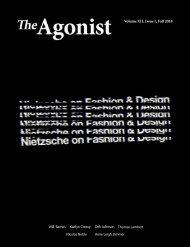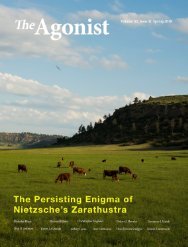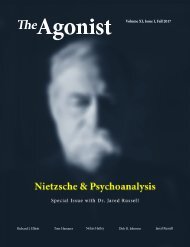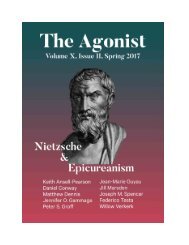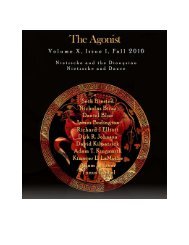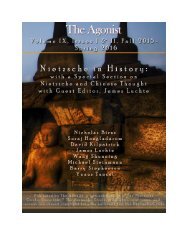Volume XII, Issue II, Spring 2019
You also want an ePaper? Increase the reach of your titles
YUMPU automatically turns print PDFs into web optimized ePapers that Google loves.
THE AGONIST<br />
Heraclitus, “the philosopher of becoming,” is supposed to say, according to<br />
Plato, “that all things are in motion and nothing at rest (...).” 20 The philosopher<br />
of Ephesus compared all things “to the stream of a river” and said “that you<br />
cannot go into the same water twice.” 21 Not only the river flows, but everything<br />
is in flux, even the observer who observes the flux: “In the same river, we both<br />
step and do not step, we are and we are not”. 22 Thus Heraclitus denied stability<br />
for the entire world. For Nietzsche, above all, Heraclitus denied the concept of<br />
being as something static, considering it illusory and fictitious. The German<br />
philosopher and philologist, Nietzsche, was a hard critic of the philosophical<br />
language. Behind philosophical concepts, Nietzsche saw prejudgments and<br />
idiosyncrasies. Nietzsche, in the mature period of his work, criticized philosophy<br />
and its dogmas, philosophers and their bias and prejudgments. By means of a<br />
strong language criticism, the German philosopher attacked the foundations of<br />
philosophy and science. And the notions of both thing and the thing-in-itself are<br />
within his criticism. In a fragment of 1887, Nietzsche wrote (KSA 12:10[202]):<br />
The “thing-in-itself” absurd. If I think away all the relationships, all the<br />
“qualities”, all the “activities” of a thing, then the thing does not remain behind:<br />
because thingness was only a “fiction added” by us, out of the needs of logic,<br />
thus for the purpose of designation, communication (...).<br />
The German philosopher considered the concept of thing-in-itself absurd<br />
because every “thing,” as language construction, depends on humans, it is related<br />
to humans. Nietzsche also criticized the notion of thing in a passage in which<br />
mathematics and the classical logic, or the principle of identity, are attacked:<br />
The invention of the laws of numbers was made on the basis of the error,<br />
dominant even from the earliest times, that there are identical things (but in fact<br />
nothing is identical with anything else); at least that there are things (but there is<br />
no “thing”) (HH 19).<br />
According to Nietzschean philosophy, a specific “thing” is a human creation.<br />
More specifically, it is a creation from the human body—it depends on the body<br />
20 Cf. Cratylus, 402a, in Plato. The Dialogues of Plato, translated by B. Jowett. London:<br />
Oxford University Press, 1892.<br />
21 Ibid.<br />
22 Heraclitus of Ephesus, 49a, in Freeman, K. Ancilla to the pre-Socratic philosophers: a complete<br />
translation of the fragments in Diels. Cambridge: Harvard University Press, 1948.<br />
34



